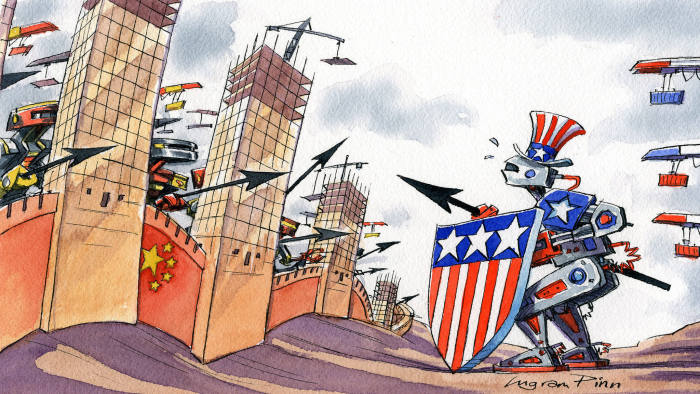Washington’s tech sanctions will not halt Beijing’s industrial advance
James Kynge

Political debate is often couched in terms of principle. But the strongest argument against the US fighting a technology war with China has little to do with right and wrong. It is simply that the US may well lose.
Washington, to be sure, has cause to feel aggrieved. It has signed several bilateral agreements with Beijing since the early 1990s to protect American intellectual property in China, only for each one to be violated in spectacular fashion by Chinese actors.
For decades, Chinese shopping malls did a roaring trade in fake Nike shoes, counterfeit Apple iPhones and other ripped-off US brands, while commercial and trade secrets were also stolen. The Commission on the Theft of American Intellectual Property estimated that in 2015 alone, US losses were worth up to $540bn — more than the entire US trade deficit with China.
But righteous indignation is not, by itself, a winning strategy. US President Donald Trump boasted this month that “the longer the trade war goes on, the weaker China gets and the stronger we get”. But others see the opposite dynamic in play: mounting losses for leading American corporations as the US and Chinese economies decouple after nearly 40 years of engagement.
The tech sanctions the US has imposed on China — restrictions on US exports to more than 140 Chinese companies on Washington’s “entity list” — were framed as punishment for wrongdoing. Beijing sees them as aggression born of fear that China will become the world’s technological leader.
A patriotic backlash in China has already begun. Cisco, the US networking equipment maker, is sounding the alarm. Chief executive Chuck Robbins said this month that Chinese state-owned companies are shutting their doors in Cisco’s face. “We’re being uninvited to bid,” he said. “We are not even being allowed to participate anymore.”
Qualcomm, a US chipmaker that gains 65 per cent of its revenues from China, faces similar headwinds. The company warned this month that revenues in the 2019 financial year will fall to a seven-year low, largely because of dwindling Chinese demand. Rival US chip companies Micron, Qorvo and Broadcom also derive about half of their global revenues from China.
“We know that US technology is often the best and we really do want to use it,” a senior Chinese tech executive said privately. “But when the supply from the US is so unreliable and so political, we are forced to find alternatives.”
These sentiments are reinforced by Chinese consumers. Huawei, the world’s largest telecoms equipment company, has seen its smartphone sales soar at home following Washington’s decision to blacklist the company in May. Meanwhile, Apple’s iPhone sales in China have slumped.
From a Chinese perspective, the US approach appears akin to the “ku rou ji”, or “bitter flesh strategy” — wounding yourself to gain advantage over an adversary. In Chinese folklore, such a desperate ruse works only if you end up inflicting greater injury on your rival.
So far, China is absorbing the pain. Its official figures show the trade surplus with the US has swollen this year in spite of tit-for-tat trade tariffs. Some US tech companies, including HP, Dell, Microsoft, Amazon and Apple, are considering shifting some production out of China. But neither this, nor the US blacklist has been able to arrest China’s tech advance.
Indeed, in several key areas, Chinese companies are already ahead. High-speed rail, high-voltage transmission lines, renewables, new energy vehicles, digital payments and 5G telecoms are just some of the industries in which Chinese companies are widely regarded as leading their US counterparts.
Opinions are divided on whether the US or China has the more vibrant start-up culture. A study by Chinese institutions in 2017 found that the country had 164 unicorns — or start-ups valued at more than $1bn — compared with 132 for the US. But Credit Suisse said in a March report that the US had 156 unicorns against China’s 93 — and China’s were of inferior quality.
Almost all sources agree that China is catching up fast — even in foundational disciplines such as artificial intelligence. “Despite China’s bold AI initiative, the United States leads in absolute terms,” the Information Technology and Innovation Foundation said this week. “This order could change in coming years as China appears to be making more rapid progress than either the United States or the European Union,” it added.
With dominance at stake, neither side appears ready to cede an inch. Dan Wang, a Beijing-based analyst at Gavekal, a research company, says that more Chinese companies are likely to be blacklisted by the US. Further steps could include limits on the export of broad categories of US-made technologies, he added.
Angry remarks by Mr Trump this week underline the risks of escalation. “Somebody had to take China on,” he said. “And it’s about time, whether it’s good for our country or bad for our country short-term.”
The problem for Washington is that such steps might indeed be bad for America — in the short term and in the longer term as well. US companies and their affiliates operating in China sell nine times more than their Chinese counterparts sell in the US, according to Gavekal. As the superpowers decouple, the US has more to lose.
0 comments:
Publicar un comentario